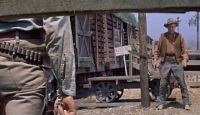Sometimes the best choice when you come to a fork in the road is to retreat, or even merge the two forks by taking one then going off road to the other! And yet binary thinking will force us to choose between the right or left fork, even if both forks suck standing alone. Only by understanding the perils of binary thinking can you protect against its destabilizing bipolar effects in conflict resolution.
First, the good. Binary logic is what makes many computer software programs run. The logic of going between “0” and “1” on streams of code is what gives direction to hardware. Not only that, but compact discs use the same logical geography to play music. Plus, in some cases, as Professor Steven Pinker points out in How the Mind Works or Malcolm Gladwell in Blink, binary logic helps us decide, often in split seconds, between: fight or flight in a dark alley, taking one fork in the ski slope or another, one moral decision as opposed to another in our relationships.
Second, the bad and ugly. The same logic that helps us make split second decisions in dark alleys also causes disaster in conflict resolution. In most but not all legal disputes I have handled, binary thinking keeps each side stuck in their black and white view of the law and facts, like the gun men pictured above. In most cases, both sides are right, and wrong, in different respects. (In others, there is a right, and a wrong, but that is quite rare.) As pointed out by Mr. John Kenneth Galbraith about the Myth of Consumer Sovereignty in The Affluent Society, rational decision making often gets irrational because consumers make decisions based on their perceived necessary choices — not their actual available choices.
The same goes with decision making in conflict resolution. Take negotiations between Democrats and Republicans. Labeling an idea “Republican” or “Democrat” can change an otherwise great idea in a split second into a horrible idea, depending on the listener’s prejudice. This is so even though each party may claim to have the same stated goal, such as less American unemployment. Rather than considering the idea with an open mind, the political listener shoves the idea into one pigeonhole or the other, even when the idea doesn’t fit into either hole, and then smashes it. Alternatively, the listener blasts the idea because it doesn’t fit into either hole. In so doing, yesterday’s distrust taints the new today. Thus, the circle of distrust is continued, as recounted in Politics of Distrust, which shows that, as of 2012, only 22% of Americans trust government.
While binary thinking can help us survive, it can, at other times, be deadly. Such thinking blinds us to innovative solutions available outside the binary system we desperately cling to. By considering these solutions, the two forks in the road can merge more often towards common goals.



